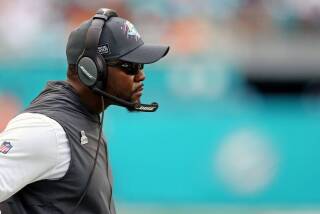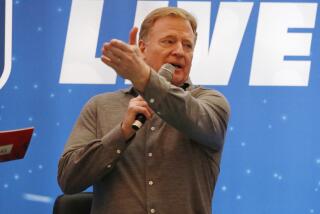NFL’s Policy on New Steroid Is Discussed
- Share via
CHICAGO — Even as the chairman of the NFL’s management council said Wednesday that players who test positive for a recently discovered designer steroid cannot use ignorance of the drug as a defense, at least one team owner said he thinks ignorance could be a mitigating factor.
“We’re still learning about certain compounds,” Houston Texan owner Bob McNair said. “I just think we have to be careful about what we do.... You need to take appropriate action, but you don’t want to do something unfairly that penalizes someone who basically was acting in good faith.”
At issue is tetrahydrogestrinone, or THG, a steroid that has gone undetected in drug tests and is at the center of a widening probe into a Bay Area supplement laboratory. The league considers THG a banned substance, as it does all steroids, and has announced plans to test for it immediately.
Harold Henderson, chairman of the NFL’s management council and the liaison between the league and the players’ union, said violators will not be given leeway, even if they say they were unaware they were using a banned substance.
“They claim that every time we get a positive steroid test,” Henderson said. “No, we could not accept that kind of explanation. Nobody knew it. Somebody slipped it to them. ‘It was in the salve they put on my knee.’ There’s always a story.”
Several sources said that, although the NFL takes pride in its strict drug policy, it is highly unlikely the league will hand down suspensions before knowing the scope of the problem. According to sources, if a relatively small number of players test positive, they might be immediately suspended and held up as examples. But if the problem is widespread, the league probably would go to the union and negotiate a postponement of the suspensions, possibly until next season.
Henderson, who could not confirm whether the testing of samples had begun, said it’s the league’s position that it can examine previously tested urine samples for traces of THG. The players’ union might have a different stance, he said, “but we’re in discussions to try to resolve any differences.”
Gene Upshaw, executive director of the NFL Players Assn., told Associated Press of the THG situation: “We are still trying to get our arms around it. There’s no doubt we believe it should be tested for. And there’s no doubt we believe it should be on the banned list.”
The THG issue is not on the agenda for the league’s two-day meetings, which conclude today, but it is a topic of discussion among team owners and league executives.
“The basic situation is that Harold and Gene Upshaw are discussing this intensively,” NFL Commissioner Paul Tagliabue said. “This particular category of steroids has been on the prohibited list for quite some time.”
Jerry Jones, owner of the Dallas Cowboys, was asked whether he finds it worrisome that the scope of the steroid probe is unknown and the drug could be used by current players.
“I don’t know about worrisome,” he said, “but with the way athletes are trying to enhance their performances today, [it] is something as a league and being in sports you really want to be sensitive about and monitor. Because you don’t want these kids hurting themselves.”
Henderson said he knows of no plans to change the league’s drug-testing procedures. As it is, a computer randomly picks six players from each team on a weekly basis, and their urine is tested.
A player who tests positive for a banned substance is suspended for four games on his first violation, six games on his second and a minimum of a year after three strikes or more.
“It’s a strict liability policy,” he said. “You’re responsible for what’s in your body. The players are taught that from the minute they come into the league. So be careful.”
More to Read
Go beyond the scoreboard
Get the latest on L.A.'s teams in the daily Sports Report newsletter.
You may occasionally receive promotional content from the Los Angeles Times.











